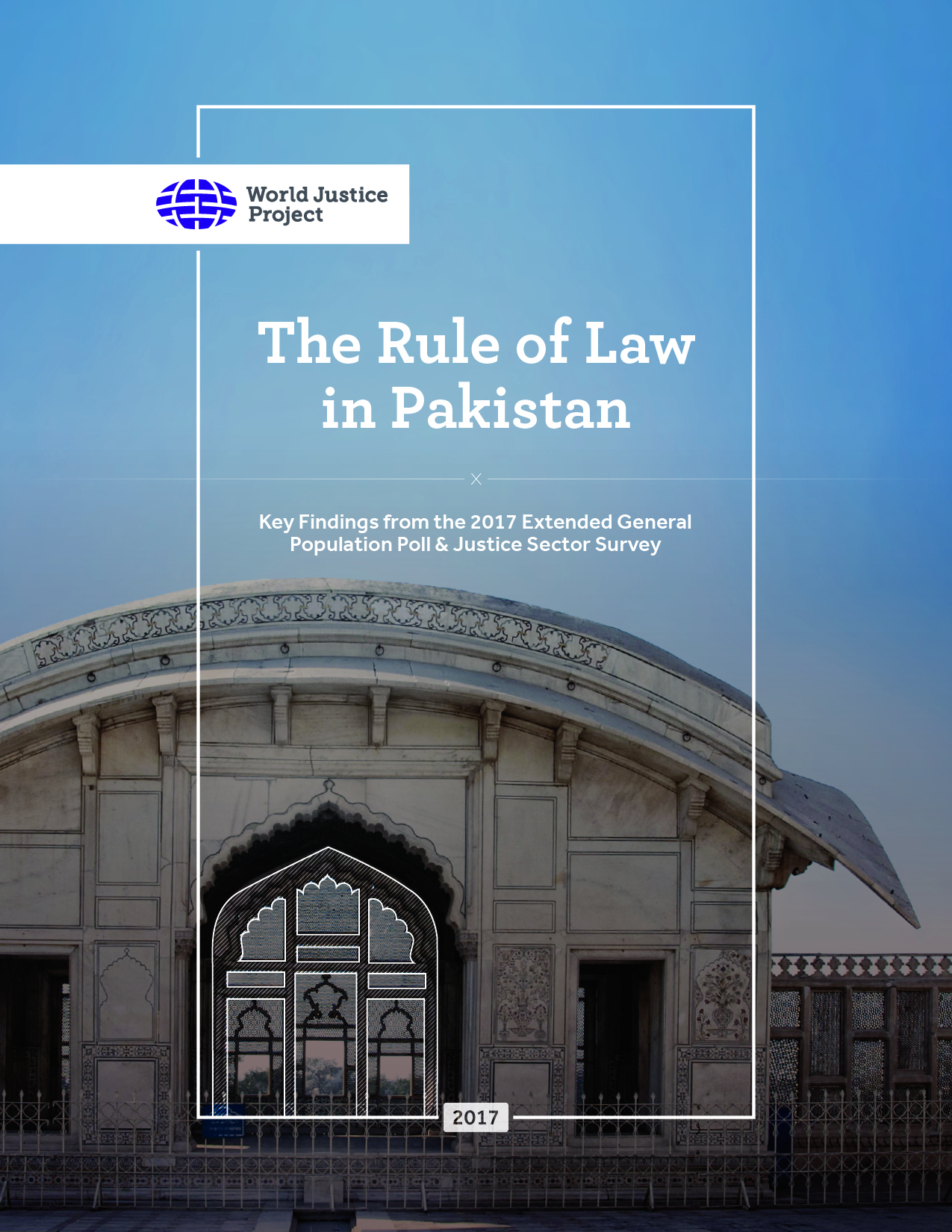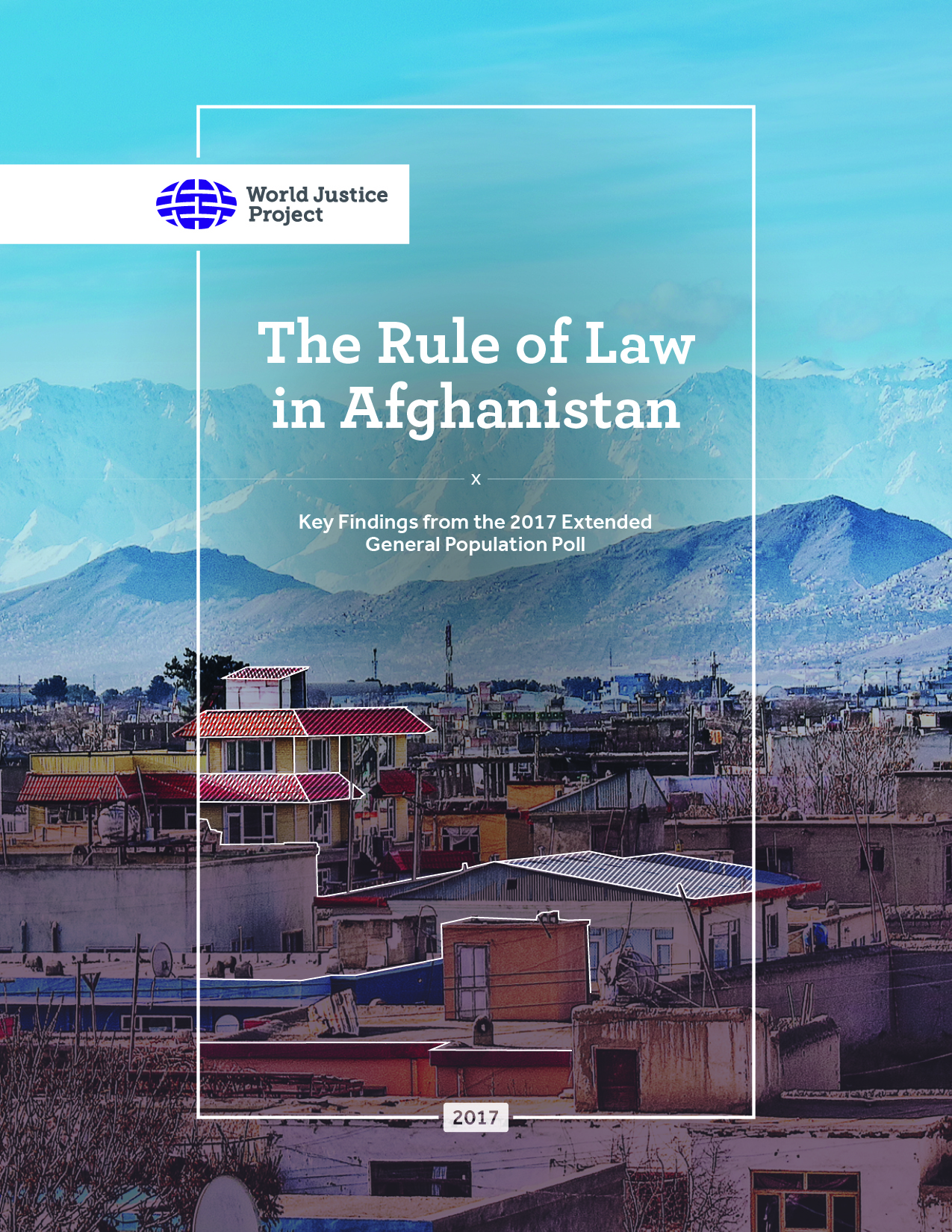
The World Justice Project is pleased to announce two new reports featuring the voices of nearly 8,000 people in Pakistan and Afghanistan. Each report is based on extended household surveys designed to capture the experiences and perceptions of ordinary citizens in areas such as government accountability, bribery and corruption, crime, access to justice, and more.
Whereas our flagship WJP Rule of Law Index® offers aggregate rule of law scores, these reports present disaggregated question-level data across multiple thematic briefs to highlight different facets of the rule of law as it is experienced by the citizens of both countries.
The Rule of Law in Pakistan: Key Findings from the 2017 Extended General Population Poll & Justice Sector Survey
 This new report presents select findings from two World Justice Project surveys conducted in five urban areas in Pakistan between August and December 2017. The General Population Poll was conducted through face-to-face interviews in 2,010 households distributed proportionally across the five urban areas of Faisalabad, Karachi, Lahore, Peshawar, and Quetta. In order to explore justice issues in greater depth, the WJP also conducted a separate Justice Sector Survey using the same methodology. This survey compiles respondents' views and experiences related to dispute resolution, legal awareness, legal identity, household dynamics, and gender issues.
This new report presents select findings from two World Justice Project surveys conducted in five urban areas in Pakistan between August and December 2017. The General Population Poll was conducted through face-to-face interviews in 2,010 households distributed proportionally across the five urban areas of Faisalabad, Karachi, Lahore, Peshawar, and Quetta. In order to explore justice issues in greater depth, the WJP also conducted a separate Justice Sector Survey using the same methodology. This survey compiles respondents' views and experiences related to dispute resolution, legal awareness, legal identity, household dynamics, and gender issues.
Highlights
- Trust in Pakistan: Pakistanis have a high degree of trust in fellow citizens. Across institutions, Pakistanis have the most trust in the courts and the least trust in the police, though trust in the police has steadily risen over the last four years.
- Refugees in Pakistan: Views on refugees in Pakistan vary by topic and by city. Half of respondents believe that refugees should be guaranteed the same constitutional rights as citizens of Pakistan. When asked about the seriousness of various problems relating to refugees, the largest percentage of respondents said that refugees bringing violence and extremism to Pakistan was a serious problem. Less than half of respondents believe that refugees and citizens are treated equally by the police.
- Bribery Victimization: Petty bribery is pervasive in Pakistan. More than half of Pakistanis have paid a bribe to receive assistance from the police and a quarter have paid a bribe to process a government permit. Since 2013, there has been an overall decrease in bribes paid to a police officer, to process a government permit, and to receive medical attention at a public hospital.
The Rule of Law in Afghanistan: Key Findings from the 2017 Extended General Population Poll
 What is the state of the rule of law in Afghanistan today? This report includes select findings from a nationally representative World Justice Project survey conducted in Afghanistan in August and September 2017. The General Population Poll was conducted through face-to-face interviews in 3,773 urban and rural households distributed proportionally across all 34 provinces of Afghanistan.
What is the state of the rule of law in Afghanistan today? This report includes select findings from a nationally representative World Justice Project survey conducted in Afghanistan in August and September 2017. The General Population Poll was conducted through face-to-face interviews in 3,773 urban and rural households distributed proportionally across all 34 provinces of Afghanistan.
Highlights:
- Access to Civil Justice: More than half of Afghans experienced a legal problem in the last two years and nearly half of those respondents reported that this legal problem led to hardship, such as a stress related illness, the breakdown of a relationship, or the loss of employment or need to relocate. Nearly one third of Afghans who experienced a legal problem reported that one party resorted to physical violence in the course of dealing with the dispute.
- Corruption Across Institutions: Afghans believe that a significant number of authorities are involved in corrupt practices, with judges and magistrates perceived to be the most corrupt authority.
- Women in Afghan Society: There are minor differences in men's and women’s views regarding the rights of women when it comes to inheritance and divorce, but the perception gap grows for questions related to women’s role in the community and household dynamics.
Download the full reports, executive findings, thematic infographics, and more on our Special Reports page here.






